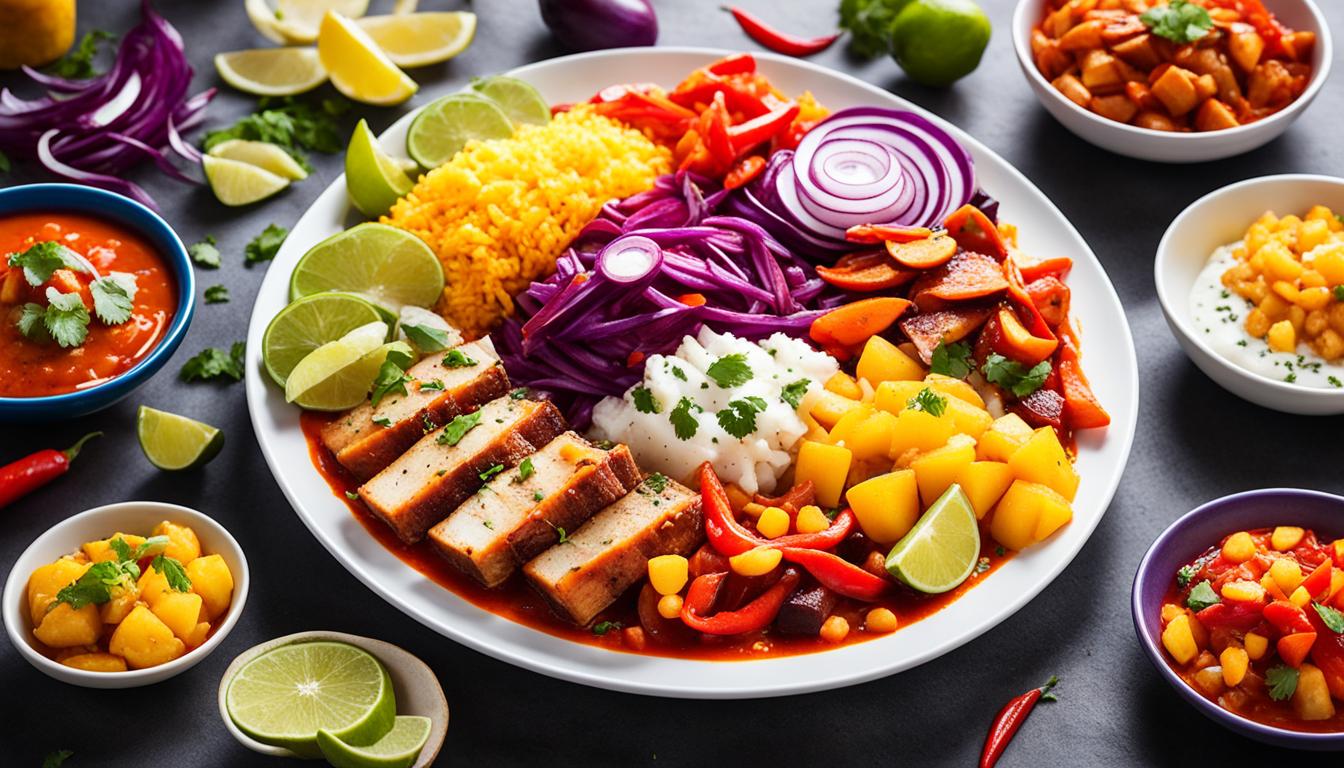A Taste of Peru: Exploring the Rich Flavors of Peruvian Cuisine
Peruvian cuisine is colorful and full of flavors that reflect the country’s heritage. It’s a blend of native ingredients and methods with those brought by various cultures. The use of fresh, local items like potatoes, corn, and seafood is key.
Rooted in history, traditional Peruvian dishes have transcended through time. They’ve mixed with newer cooking styles to create “Novo Andean cuisine.” This blend shows Peru’s culinary innovation. Lima, the capital, is home to top-notch restaurants, making Peru a global food destination.
So, what sets Peruvian food apart? Its rich history and ingredients from the land and sea contribute. This cuisine stands out worldwide, attracting food lovers everywhere.
Key Takeaways
- Peruvian cuisine is a vibrant fusion of indigenous ingredients and cooking techniques with global influences.
- The cuisine is known for its use of fresh, locally sourced ingredients like potatoes, corn, quinoa, and seafood.
- Peruvian cuisine has a rich history, with traditional dishes passed down through generations.
- The culinary landscape has evolved, blending traditional recipes with modern techniques, giving rise to “Novo Andean cuisine.”
- Peru is hailed as a premier culinary destination, with its capital, Lima, boasting some of the finest restaurants in South America.
Peruvian Cuisine: A Captivating Fusion of Flavors
Peruvian cuisine tells a story of rich history and diverse cultures. It began with the Inca Empire, using humble foods like potatoes and corn. The arrival of the Spanish conquistadors in the 16th century added new elements, such as lamb and chicken. This mix created a unique blend of flavors.
Origins: A Harmonious Melange of Flavors
Today’s Peruvian dishes are a unique blend of influences from around the world. They show Peru’s willingness to embrace culinary diversity, combining traditions from Europe, Africa, and East Asia. This mix has led to an extraordinary culinary experience.
Influences: A Culinary Fusion from Around the World
The Spanish conquest in the 1500s introduced European cooking styles. Then, in the 19th century, Chinese immigrants brought their cooking techniques, leading to chifa cuisine. This blend is a mix of local ingredients with Chinese flavors.
Favorite Traditional Peruvian Dishes
Peru’s cuisine includes many favorite dishes, such as ceviche, lomo saltado, and aji de gallina. It also features local specialties like papas a la huancaina and cuy. These dishes highlight the diverse cultures and modern techniques behind Novo Andean cuisine.
The Culinary Capital: Savoring the Flavors of Lima

Lima is the Gastronomic Capital of Peru. It offers a mix of local and international foods. This blend comes from Spanish, African, Chinese, and Japanese cooking.
The Fusion of Flavors: Lima’s Culinary Melting Pot
Lima’s diverse culture has blended different cooking styles. This created a unique eating experience. Visitors can enjoy everything from street food to fancy dishes.
Ceviche, the Jewel of Lima
Ceviche is raw fish or seafood in citrus juice. It’s a favorite in Lima. This dish shows the love for fresh foods and traditional cooking methods there.
Pisco, the National Spirit
Pisco is a famous grape brandy in Lima. It’s used in the Pisco Sour, Peru’s national drink. This cocktail is a big part of Peruvian culture and found all over the city.
Nikkei Cuisine: Japanese-Peruvian Fusion
Nikkei cuisine combines Japanese methods with Peruvian ingredients. It’s unique to Lima. This blend offers an amazing variety of flavors, showing the city’s culinary skill.
Lima has food for everyone. From the lively street food to upscale dining. Trying ceviche, Pisco Sour, or Nikkei cuisine is a must. These dishes make Lima a top food destination in the world.
Conclusion
Peruvian cuisine offers a unique journey for food lovers. It introduces diverse flavors and ingredients with cultural influences. Tasting ceviche and cuy carries Peru’s deep history and cultural mix. This makes Peruvian food stand out as something both unique and delicious in the world.
The world of Peruvian cuisine is vibrant and inviting. It highlights Peru’s rich food culture that mixes local and global flavors. Peruvian dishes are a fusion of various influences, showing the country’s cultural wealth. This mix defines Peruvian cuisine and its resilience over time.
Peruvian food is gaining more attention worldwide. Its unique blend of flavors continues to intrigue and inspire people globally. This culinary landscape is leaving a lasting impression on food lovers everywhere.







